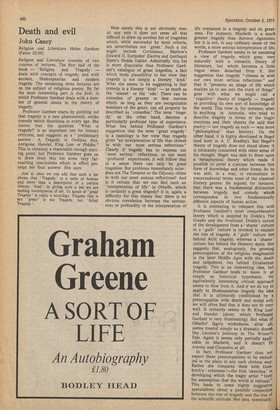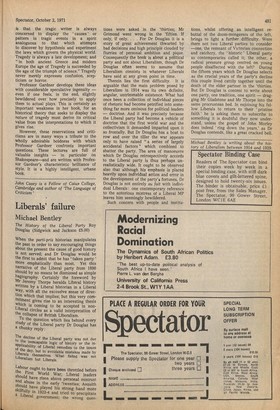Death and evil
John Casey
Religion and Literature Helen Gardner (Faber £2.00) Religion and Literature consists of two courses of lectures. The first half of the book — 'Religion and Tragedy' — deals with concepts of tragedy, and with ancient, Shakespearian and modern tragedy. The remaining three lectures are on the subject of religious poetry. By far the most interesting part is the first, in which Professor Gardner deals with a number of general issues in the theory of tragedy.
Professor Gardner starts by pointing out that tragedy is a rare phenomenon, unlike comedy which flourishes in every age. She insists that the question 'What is tragedy?' is an important one for literary criticism, and suggests as a "preliminary answer : A Tragedy is Oedipus Rex, Antigone, Hamlet, King Lear or Phedre." This is certainly a reasonable enough starting point, but Professor Gardner goes on to draw from this list some very farreaching conclusions which in effect preempt her final answer. She says :
And at once we can add that such a list shows that ' Tragedy ' is a term of honour and more than a description of a certain literary ' kind '. In giving such a list we are naming masterpieces of art. To speak of 'great Tragedy' is really a tautology. Tragedy that is not ' great ' is not Tragedy, but 'tailed Tragedy '.
Now surely this is not obviously true. At any rate it does not seem all that difficult to draw up another list of tragedies which, while successful by most criteria, are nevertheless not 'great.' Such a list might include Coriolanus, Marlow's Edward II, Euripides' Electra and (perhaps) Ibsen's Hedda Gabler. Admittedly this list is more disputable than Professor Gardner's catalogue of great tragedies, a fact which lends plausibility to her view that tragedy is not simply a literary 'kind.' What she seems to be suggesting is that comedy is a literary ' kind ' — as much as the ' sonnet ' or the 'ode.' There can be comedies of greater or less success which, so long as they are recognizable members of the genre, can all properly be described as ' comedies.' The term 'tragedy,' on the other hand, denotes a particularly profound type of experience. What lies behind Professor Gardner's suggestion that the term 'great tragedy' is a tautology is her view that tragedy gives "an interpretation of life that chimes in with our most serious reflections." Clearly if tragedy has to express our 'most serious' reflections, or our most ' profound ' experiences, it will follow that in a sense there can only be great tragedies. But problems immediately arise : does not The Tempest or the Odyssey chime in with our most serious reflections? And is it certain that we can find such an 'interpretation of life' in Othello, which is certainly a great tragedy? It is, again, a difficulty for this theory that there is no obvious correlation between the seriousness or profundity of the interpretation of life contained in a tragedy and its greatness. For instance, Macbeth is a much greater tragedy than Samson Agonistes, but it is not, in any ordinary sense of the words, a more serious interpretation of life.
Professor Gardner seems to be assuming a view of tragedy which goes very naturally with a romantic theory of literature, but which becomes a little vague when detached from it. Her suggestion that tragedy "chimes in with our own most serious reflections" and that it "presents an image of life which enables us to see into the truth of things" goes with what we might call a ' cognitive ' theory of tragedy — tragedy as providing its own sort of knowledge of the world. This view is, for instance, alien to anything in Aristotle, who tried to describe tragedy in terms of the tragic emotions and their objects (he said that poetry — not tragedy as such — was more ' philosophical ' than history). On the other hand, it is highly developed in Hegel (and later in A. C. Bradley). But Hegel's theory of tragedy does not stand alone; it is intimately connected with other areas of his thought. Hegel was able to draw upon a metaphysical theory which made it possible to point a contrast between this form of knowledge and other forms. So he was able, in a way, to reconstruct in transcendental terms most of the classical literary genres. He argued, for instance, that there was a fundamental distinction between tragedy and comedy which corresponded to two fundamentally different aspects of human action.
It is interesting to compare this with Professor Gardner's most comprehensive theory which is inspired by Dodds's The Greeks and the /rrational. Dodds's notion of the development from a ' shame ' culture to a ' guilt ' culture is invoked to explain the rise of tragedy. A ' guilt' culture lies behind Attic tragedy, whereas a ' shame ' culture lies behind the Homeric epics. She suggests that, analogously, the growing preoccupation of the religious imagination in the later Middle Ages with sin, death and judgement, lies behind Elizabethan tragedy. This is an interesting idea, but Professor Gardner tends to leave it as simply an historical hypothesis. No equivalently interesting critical approach seems to flow from it. And if we do try to apply to Shakespearian tragedy the idea that it is ultimately conditioned by preoccupation with death and moral evil, we will often find that it does not fit very well. It certainly seems to fit King Lear and Hamlet (about which Professor Gardner is very illuminating). But what of Othello? Iago's wickedness, after all, seems treated simply as a dramatic donne, like Leontes's jealousy in The Winter's Tale. Again it seems only partially applicable to Macbeth, and it doesn't fit Antony and Cleopatra at all.
In fact, Professor Gardner does not expect these preoccupations to be embodied in the plays in any such obvious way. Rather she compares them with GoMbrich's 'schemata '—the first 'sketches,' in developing which the tragic artist "tests his assumption that the world is rational." This leads to some highly suggestive speculations about a possible connection between the rise of tragedy and the rise of the scientific attitude. Her idea, essentially,
is that the tragic writer is always concerned to display the ' causes ' or pattern in tragic events in a spirit analoguous to that which attempts to discover by hypothesis and experiment the laws which govern the physical world. Tragedy is always a late development; and "in both ancient Greece and modern Europe the age of Tragedy is succeeded by the age of the triumph of science." Tragedy never merely expresses confusion, scepticism or horror.
Professor Gardner develops these ideas with considerable speculative ingenuity — even if one feels, in the end, slightly bewildered over how precisely to apply them to actual plays. This is certainly an important weakness in her book, for an historical theory that seeks to display the nature of tragedy must derive its critical value from the interpretations to which it gives rise.
However, these reservations and criticisms are in many ways a tribute to the wholly admirable boldness with which Professor Gardner confronts important questions. These lectures are full of valuable insights — in particular on Shakespeare—and are written with Professor Gardner's characteristic brilliance of style. It is a highly intelligent, urbane book.
John Casey is a Fellow of Caius College, Cambridge and author of 'The Language of Criticism '

































 Previous page
Previous page